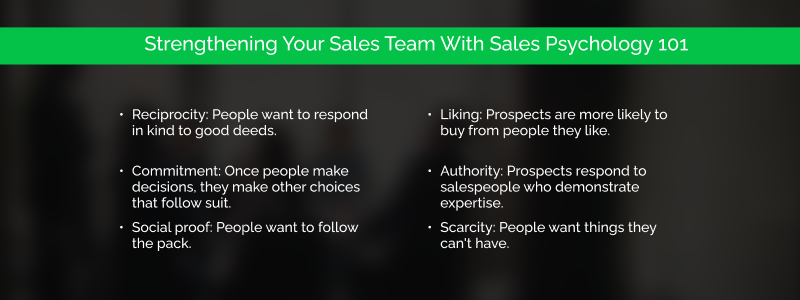Strengthening Your Sales Team With Sales Psychology 101

When your team understands the psychology of sales, they'll close more deals.

Sales psychology involves understanding the psyche of your target market to sell more products and services. With this approach, you don't convince customers they need what you’re offering. Instead, you market to their wants and needs. When you leverage psychology, your prospects buy your products or services, not because you've convinced them, but because they believe they need what you're selling.
There are varying motivations for buying a product or subscribing to a service. Some customers logically reach a decision, whereas others buy impulsively and rationalize the purchase later. As a sales professional, you need to understand how your prospect thinks, feels, and makes decisions. To close deals, your sales team needs to leverage these six universal principles of influence.
Reciprocity
Reciprocity is a desire to repay others for what they have provided. This plays often plays out in simple ways. If you hold the door for someone, they might let you go in front of them in line. If you send a holiday card to someone, they might send you one back.
Reciprocity often plays out in sales when a salesperson gives someone a freebie. For example, charities send free gifts to encourage donations. Or a bartender might give a customer a drink on the house to encourage them to leave a larger tip or return visit.
Commitment and consistency
Once people make a choice or take a stand, they consistently behave in a way that supports that decision. In other words, they intuitively double down on their original decision. If they didn't, they would experience cognitive dissonance.
In sales, this often takes the form of starting with a small request and making it bigger over time. For instance, persuading sometime to try a free trial subscription and, if they’re satisfied, upgrade them with a paid subscription at $20 a month. Then, you can offer an enhanced subscription for $30 per month. This foot-in-the-door strategy leverages the concepts of commitment and consistency to gradually turn a skeptical prospect into a loyal customer.
Commitment and consistency can turn a no into a yes. Consider the “slammed-door technique.” With this approach, you pitch the prospect to make a big purchase or commitment. When they say no, you respond by asking for a more modest investment. With persistence, they are more likely to say yes because most people don’t want to be that person who always says no.
Social proof
When people are unsure, they look to others like them to show them the right course of action. The more people a prospect sees making a particular choice, the more likely they are to follow.
Supply and demand can drive social proof. Sometimes people prefer a product or service that's only available to an elite few. They want something not because everyone has it, but because people they envy have it.
The classic way to leverage social proof is to reference past customers’ satisfaction. Influencers, social-media shares, industry awards, or expert endorsements also provide social proof that a prospect should buy your product or service.
Likeability
People tend to agree with people they like. A slick salesperson may close some deals, but they won't close as many as a sincere salesperson. Likeability is a key factor in making sales.
To utilize this psychological element, build rapport with the prospect. You need to believe in what you're selling. You can't force the outcome; draw in the prospect and get them to like you. They'll trust your opinion, believe what you're saying, and become more likely to buy or subscribe.
Authority
If the prospect likes you, they'll trust you. But, authority goes a step further than trust; it establishes that you're an expert. You're not just pitching a product or service; you can answer a prospect's questions.
This requires extensive knowledge about your product or service, and managing the conversation in a professional manner. You need to balance personability with professionalism. Summarize ideas so they’re clearly understood, and encourage the prospect to ask questions.
Scarcity
In economics, the scarcity principle refers to prices increase when demand outpaces supply. In sales, this principle reflects how people always want more of what they can't have. For instance, people are more likely to pay extra for a ride-sharing service if their phone is about to die and they face the threat of being stranded. Brands often leverage limited-time offers to entice shoppers. As noted before, people want luxury products that most consumers can’t get.
A deep understanding of sales psychology can help executives and their sales teams boost motivation, engagement, and productivity. Do you understand sales psychology? Does your team know how to leverage these principles to close deals?
Founders often have a strong intuition about closing deals, but can't articulate their methods to their sales teams. This can make it hard to move from founder-selling to growth-mode selling. We can help.
MetaGrowth improves our clients' sales teams. We provide recruiting, training, and development services that help your sales team meet their full potential and grow your business. Ready to talk? Contact us today. Let's see how we can elevate you and your team.
Written by
Joe Arioto
